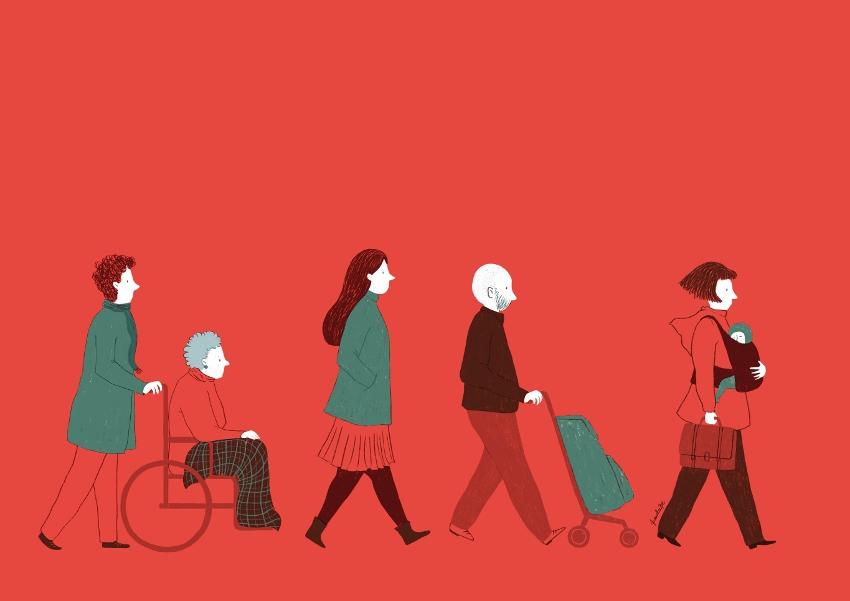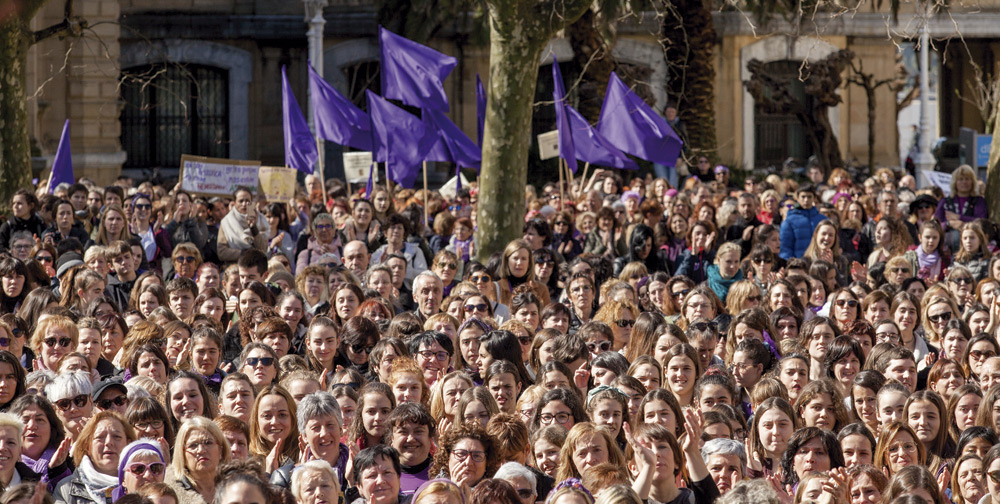This ill-served collective responsibility
- A year has passed, on International Working Women’s Day, since a feminist strike was called in more than 70 countries. Thousands of women stopped working in factories, homes, markets and education on March 8, 2018. The feminist struggle marked a historic date with purple ink on calendars and marked a milestone on its way. In line with last year’s approach, this year’s call for strike goes one step further: planting throughout the day. A capitalist, heteropatriarchal and colonialist system that is not sustained in the absence of the works performed by women.

As the system goes through our lives, by challenging them we inevitably face each other. The idea of women standing up one day, not only in the bases of the system, but also in the daily lives of all of us, makes the difficulties and discomforts to organize life manifest when, as was proved last year, the work done by women in both public and private spaces is in the air, the disabilities that we have to organize life if it does not dominate half of society. That is also reflected in our lives, to the point of making apparent the inequality we live in. Precisely for this reason, the feminist strike is a powerful tool of transformation: the discomfort generated by the awareness of the chains themselves can be a fuel for revolution. The Feminist Movement of Euskal Herria has warned in the dossier regarding the strike that in order for the feminist transformation to occur, conflict is necessary, "especially in those areas that have remained out of the political conflict". One of these areas is Vigilance, which, following the work begun last year, will alleviate this year’s strike.
Responsibility for care: from the private to the collective
If the scope of surveillance has been left out of the political conflict, it is because the heteropatriarchal capitalist logic differentiates the works performed in the public and private spaces. This distinction has placed the paid work (so-called productive work) that is carried out in the labour market in value and the work on sustaining life (so-called reproductive work) has placed it in the private sphere, making it invisible and free of charge, or precarious, as if they were not valuable for sustaining life and producing capital. The following data pairs can help you see things differently: The Satellite Account for Domestic Work (Eustat) figures in 2016 at €21,342 the added value of the CAV for reproduction and care of life, 32.4% of GDP. The gender distribution of these studies is detailed in the 2013 statistics: 66.7% are women and 33.3% men. As Amaia Pérez Orozco, a feminist economist in Feminist Economic Subversion (Feminist Economic Subversion) says: “The responsibility to sustain life is feminized because it relates to feminized values.” Nothing else. To understand the feminization of care, therefore, it will be in political terms.
Feminist Movement of the Basque Country: "To that
we go on strike, to bring about a
break with the system and demand a new social pact"
“Thanks to the exploitation of women* these jobs go to the system for free, let’s not say that by crossing with racism (…) Capital could not accumulate so much wealth if all these jobs were not done free of charge or in inadequate working conditions,” the Feminist Movement denounces. With the conviction that no woman will be free if she is not granted a social reorganization of care, they say: “We know that capitalism cannot be remade without defeating women.” If women are planted, everything is left. Therefore, we go on strike to bring about a break with the system and demand a new social pact.” ‘Towards the center of life’, claiming this year’s feminist strike, responds precisely to that goal: to make its support the center of life a collective responsibility, affecting the entire social structure. Because if women are planted to sustain lives, it's necessary to think about how to sustain life collectively, if we want to maintain it. And this is what interests us all directly. Throughout life, in one moment or another, we all have to give and receive care.

Attempts to collectivise responsibilities
From institutions to men, the strike puts on the wall all those who have a direct relationship with the unequal distribution of care, which forces them to think about how to manage the care left in the air. In this sense, last year’s feminist strike was a pilot test that left several essay models regarding the collectivization of care responsibility.
The field of education can be, together with the family sphere, one of the areas in which there may be the most headache during the strike day when it comes to the management of care. It concentrates a large part of the population in need of care, as children and young people spend many hours a day in schools. In addition, the profession of teacher is feminized. In this sense, the curriculum of mothers and teachers of students puts in serious difficulties the educational centers in the management of care tasks. Last year, improvisation was predominant and local centers decided how to adapt to the day of strike: in some centers, instead of organizing collectively, the possibility of doing strike was left in the hands of the individual; in other places, cloisters were held and in some centers only decided to go to the work of male professors, prioritizing the tasks of care over teaching; on the other hand, there were centers that decided directly to close the centers.
The union Steilas pointed out last year the need to organize collective care with parents in the face of the 2019 strike, considering that in the face of these diverse decisions, important work was still pending in the centers. Asked if work is being done in this regard, union member Nagore Iturrioz explained that in the end men have decided not to focus things. As the male organization was among the demands of the strike, they found it reasonable to leave this task in their hands: “After all, we (women*) would do the job again.” In this sense, Steilas has confined himself to inviting the centers to become a space of care and to complete a didactic unit to work on the strike, although he has shown himself willing to help those who need it: “They should be organised autonomously, but we are willing to help in case you need information.”
In the face of the need for help, Iturrioz has been sympathetic: “We have launched a number of proposals for those who identify as men, but it is difficult to implement them. How can we get the unknown people to move the boys and girls to schools that have become care zones? It's not that easy, and that's why I say it's something that has to come out of the village, out of the vicinity. That has to be structured well.” In this sense, he has pointed out that the community work carried out on March 8 of last year by the men of the Donostia neighborhood of Egia is an example, and that with this antecedent is intended to make the educational centers known, “so that whoever is interested can contact and organize with them”.
Auzolan as the axis, men organized themselves in the Civic Center of Errondo in the San Ignacio neighborhood of Bilbao. After reflecting on the role of men in the context of the feminist strike, Adrián Gómez Yague, a member of the Civic Center, explained that they decided to assume the tasks of care and the economic costs of the day. So throughout the day, they kept the space open and took over the food. “The group of about 35-40 people made up of women* we gave him food and at lunchtime they left a child with us,” he said. “We knew that although it was possible to bring people closer to food, few people would be willing to leave a family member in charge. Perhaps it was an ambitious approach,” he reflected. Despite the auzolan, the men of the Center met the challenge posed by Iturrioz: How do we get people's confidence to leave the people who care for them in these places and in the hands of strangers?
Gomez has announced its intention to move to the assembly the proposal that it be organized among men on the day of the strike and has hoped that the reception will be greater than last year. It is clear that the strike requires a role for men: “I believe that in a strike like that of March 8, the role of men is important, not at all fundamental, but necessary in our discourse if we are ‘allies of feminism’. (…) Such a small but symbolic action can make it easier for women to take a strike*”.

Leire Medrano Asenjo and Ane Labiano Etxebarria report how they lived the other side of the workshop, dedicated to the responsibility of surveillance tasks. Both are mothers, but because the circumstances of each one of them are different, they made a strike differently. Medrano, who is separated, did not take care of the custody that day. Thus, they organized themselves as families to give way to care. He says that his father offered to take care of the children, including his sister's: “Normally, my father takes care of his grandchildren, and that day they also stayed in charge.” The women of the house went out into the street and the grandfather took care of the children until they returned at night. "The responsibility that my father did not take with me has now been taken with his nephews, as an aitite. (…) He has learned to enjoy since he retired, and also the positive side of care,” he reflected. He has anticipated that they will be adapted in the same way this year.
Labiano had just given birth and, in her case, “the care strike was impossible”. The boy went on strike, because he thought it was more important that he had a chest than a strike. The duties did remain in the hands of the couple, although it was not a novelty: “We distribute the work in this way almost always: he does more work at home, and I give more time to care for the child.” Yes, he has reported that on that day his partner also made a meal to his mother, so that they could go on strike together. He says that he is present in the usual reflection on housework and care, although he recognizes that “in daily life things are complicated”. In view of this year’s strike, it is feasible not to take care of the child for a while, but not for the whole day, as the baby is still small.
We're not all yet
This year, as an all-day strike was called last year, it can be expected that the difficulties women will face in carrying out the strike will be greater. If last year served to awaken the consciences of the chains themselves, this year you could see if the chain is more or less connected. However, without the need to raise the level of challenges, some found limits that prevented a strike in the same call last year.
Surely, the sector of women with the most difficulties to strike is that of domestic caregivers. Most are migrants and suffer from the springs of triple oppression – race, class and gender – performing jobs that no one wants to do, such as caring for the elderly. Silvia Carrizo of the Malen Etxea society clearly spoke to journalist Malen Aldalur on this subject: “We need foreign women in situations of dependency and slavery to provide our care networks in the Basque Country.” The day of strike is no exception.
The number 64 dated July 2017. In the Basque Sociometer 60, it is pointed out that, if one wonders what is the best way to care for the elderly, one prevails a favorable opinion for family care. Behind this option, the majority of the population bets that a hired person can care for the elderly in their own home, where caregivers or domestic workers come into play. In the first case, as in nursing homes, there has been a tendency to outsource workers through private companies, which has caused their working conditions to deteriorate. The situation of domestic carers is no better, the data is scandalous: According to statistics from the Bizkaia Household Employees Association (AHT) of 2018, a quarter of household employees are not discharged from Social Security, at least 80% are foreigners and about 75% have a working day over 60 hours per week. Striking under these conditions is not just any challenge.

“Even if domestic workers are willing to strike, their involvement is difficult, as they aim for survival. Our demands are sometimes far from those who need it most,” explained Katia Reimberg, of the Bidez Bide association, in defence of the rights of migrant women. According to Oneyda Sáenz, a domestic worker, “one of our main problems is that we don’t have time to get together, we have to juggle together to gather as many women as possible, because domestic workers don’t have time, because this work is slavery.” In addition, he mentioned another of the main problems preventing them from taking part in the strike: the fear of being fired. In fact, “although in principle we have the right to strike because we are workers, they do not perceive us as workers”, which demonstrates the lack of guarantees on labour rights. Out of fear of losing their jobs, “not everyone has the courage to stand up and complain,” so Sáenz tries to “give voice to those who keep quiet.” Despite the difficulties, on 8 March they will go to the streets: “We will go as far as we can, but from today we know that we will be few. Therefore, we are making some silhouettes to go out into the street, to represent the missing ones.”
Katia Reimberg: “We talk a lot about the global chain taking care of, but what do we do with them? What is our role?”
Last year, an action at the Bizkaia Bridge of Portugalete (Bizkaia) to make the workers of the house visible, began a day of strike in the area of Bilbao. Their objective was to make visible the women who would go to work in the Left Margin of the Ría to the houses of the Right Margin, to emphasize that many caregivers would not be able to participate in the strike. Aside from this action, according to Sáenz, last year when organizing the strike they did not take into account their collective. However, he is pleased because for a year things have changed and since then they have been raising their situation to include them in the political agenda of feminism. “We have created consciences, we have made us see what we are living, we have made it clear that we are also people,” he says.
Reimberg also believes that the situation of home carers is becoming increasingly apparent. However, considering it still insufficient, he believes that more needs to be done: "We have to join forces to change many things, because there is no political will to do so. People engaged in politics have to make laws to change the situation of home carers, because the situation is not sustainable (…) Europe is forgotten that it is old”. It has stressed that the improvement of the situation of domestic workers is not exclusive to the people of politics, but to all, and has underlined the need for intervention, rather than reflection: “We talk a lot about the global chain taking care of, but what do we do with them? What is our role?” In this regard, it sees a creepy push for the 8 March strike to be maintained, but believes that it must be fought “every day as 8 March.” One of his “utopias” is that at the moment everyone is out in the street on 8 March. Utopia horizon, where to go and what to fight.
"Demands for care"
In order to dignify and value the work of caregivers and domestic workers, several associations have published a list of claims. The letter states:
• Properly define the work of caregivers and household employees with a professional profile, determining the functions of each one of them.
• Ensure decent work conditions for both the caregiver and the caregiver.
• Claim the contract for caregivers and improve and modify the laws to dignify the work.
• Not to turn regulation into an expulsion measure for women working in this field of work.
• To take into account the situations of violence and abuse suffered by immigrant women.
• That in the private sector services companies guarantee decent working conditions for their workers.
*’The term ‘woman’, while limiting the inclusion of diverse bodies and identities that transcend the binary gender system, includes this diversity in this article. As in the dossier of the Feminist Movement of the Basque Country, “when we use the word woman* we speak of subjects trampled by heteropatriarchates”.
After a month, the feminists will take to the streets the day of working women. We have an annual appointment that we have organised and prepared enthusiastically every year. Last week we looked back at the Portugalete Assembly, remembering the feminist strikes of 2018 and... [+]
Azken urteetan mobilizaziorako gaitasunari dagokionez nabarmendu den mugimendurik bada, feminista da horietako bat. Bi urtez segidan, greba tresnatzat, martxoaren 8 arrakastatsuak burutu ditu; kapitalaren logikari bizitzarena gainjartzea exijitzeko, milaka emakumek lan orori... [+]
On February 2, 2018, the kazkaba through the streets of Donostia-San Sebastián with a loud noise. The Euskal Herria Feminist Movement calls for a feminist strike on March 8. This was a recognition of the struggle of the cigarreros of Tabakalera: dozens of women*, witnesses of... [+]
In studying economics, I've never seen the concept of strike, even though the link between them is very straightforward. The reason is obvious: economic power defines what the economy is. In the strike of women the invisibility is double, because the analysis is done with the... [+]
Ikusi dugu lehenago. Ekologismoa da adibide paradigmatikoa. Halaber, pink washing-a edo gaypitalismoa. Merkatuak gure borrokak irentsi, digeritu eta gorotz moduan produktu kapitalista bat iraizten digu, salmentarako prest, sistemari funtzionala egiten zaiona.
Hedabideek... [+]























